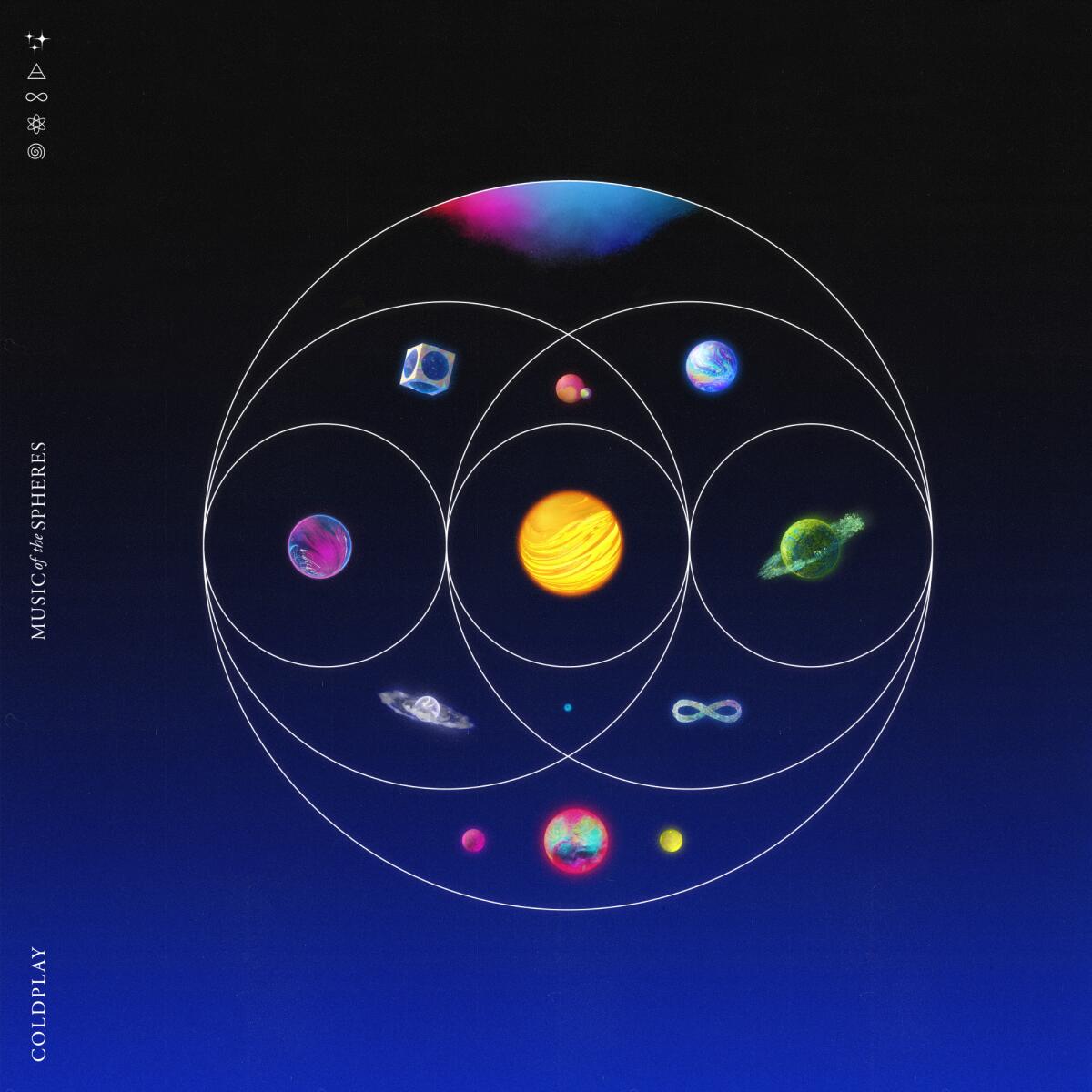Review: Coldplay successfully turns to Max Martin for hits, but there’s no helping these lyrics

Look, there’s no defending the lyrics on this new Coldplay album.
In one song from “Music of the Spheres,” which carries some sort of overarching concept about the citizens of a distant galaxy, frontman Chris Martin actually sings these words in this order: “We’re only human / But we’re capable of kindness / So they call us humankind.”
In another he compares himself to a broken record that’s “not playing right,” then delivers the same line in reverse, I guess to prove it?
“Drocer nekorb a ekil mi,” Martin sings — an all-time groaner no one can say looked good on paper.

But if these embarrassments deserve all the eye rolls they’re getting in largely unimpressed reviews of “Music of the Spheres,” Coldplay seems worth sticking up for in regard to another point of emerging critical consensus: that the British band’s ninth studio LP — an eager collaboration with teen-pop hitmaker Max Martin that features appearances by BTS and Selena Gomez — somehow represents a betrayal of the once-honorable Coldplay ethos.
“Spheres” has been described as craven and desperate; it’s been widely characterized as a transparent commercial ploy at a tough moment for old guys with guitars. Sniffed the Guardian: “There must be more dignified ways to stay at the top.”
Adele’s first new song in six years, ‘Easy on Me,’ is the lead single from her forthcoming album, ‘30,’ due Nov. 19.
But when was this group ever dignified? Since Chris Martin and his bandmates broke out more than two decades ago with the shamelessly sentimental “Yellow” — “I wrote a song for you / And all the things you do” — the whole point of Coldplay has been voicing the big, cringe-y emotions other musicians are too cool (or too concerned with appearing cool) to voice.
True, they didn’t start out enlisting Top 40 song doctors to help run those feelings up the charts. There was nothing unambitious, though, about songs like “Clocks” and “Viva la Vida” that deployed hand-played arrangements to mimic the increasingly mechanized sound of mid-2000s pop.

And soon enough they were recruiting folks from beyond their guitar-band milieu: Rihanna for “Princess of China,” Avicii for “A Sky Full of Stars,” the gosh-darn Chainsmokers for “Something Just Like This,” which remains Coldplay’s most-streamed track on Spotify with more than 1.6 billion plays.
So it’s not quite clear why the two Martins’ meet-up on “Spheres” is being viewed as especially brazen, except that the new album follows a relative bomb from Coldplay in 2019’s experimental “Everyday Life,” which dabbled in African and Middle Eastern music and failed to spin off any monster singles. Thanks to the pandemic — and to Coldplay’s avowed commitment to figuring out how to travel in an environmentally sustainable fashion — “Everyday Life” also came and went without one of the band’s global stadium tours. (This week the group announced it will return to the road in 2022 with a “dance floor that generates electricity when fans jump up and down,” as the BBC put it.)
Notwithstanding that heightened motivation, “Spheres” is in reality no more — or less! — on the nose than Coldplay’s earlier albums; that the band never before titled songs with emojis, as it does several times here, was almost certainly a function of technology rather than taste.
“Humankind” and the vaguely Weeknd-ish “Higher Power” are zippy electro-rock tracks with sharp hooks and lots of crisp digital detailing; the mellow, love-dazed “Biutyful” pitches up Chris Martin’s vocals to an unintelligible chipmunk squeak — not a bad move given that he turns out to be telling somebody, “I hope they name you a rocket and take you for a ride for free.”

The singer unloads more declarations of interstellar devotion — one presumes he’s singing about actress Dakota Johnson, whom he’s been dating for four Earth years — in “My Universe,” the cut with BTS, which recently gave Coldplay its first No. 1 on Billboard’s Hot 100 since 2008. (For BTS, it was the boy band’s first trip to the top since, uh, July.)
“In the night, I lie and look up at you,” Martin sings over a shimmering disco groove, “When the morning comes, I watch you rise.” Drippy, as usual, but this is not a song that should scandalize anyone not scandalized by “Adventure of a Lifetime” in 2015, back when Martin was working with Stargate and writing sappily about dating Jennifer Lawrence.
More intriguing on “Music of the Spheres” is the Gomez duet, “Let Somebody Go,” an undulating white-soul ballad with big Bruce Hornsby energy that sort of puts the lie to the whole happy-sellout idea.
Ditto the stomping hard-rock “People of the Pride,” which has fuzzy guitars, vaguely political lyrics and a dark and jazzy horn chart sure to remind you of Coldplay’s old heroes in Radiohead.
It’s by far the album’s worst song, and the one that feels most unshaped by Max Martin’s touch. Careful what you wish for.
More to Read
The biggest entertainment stories
Get our big stories about Hollywood, film, television, music, arts, culture and more right in your inbox as soon as they publish.
You may occasionally receive promotional content from the Los Angeles Times.












